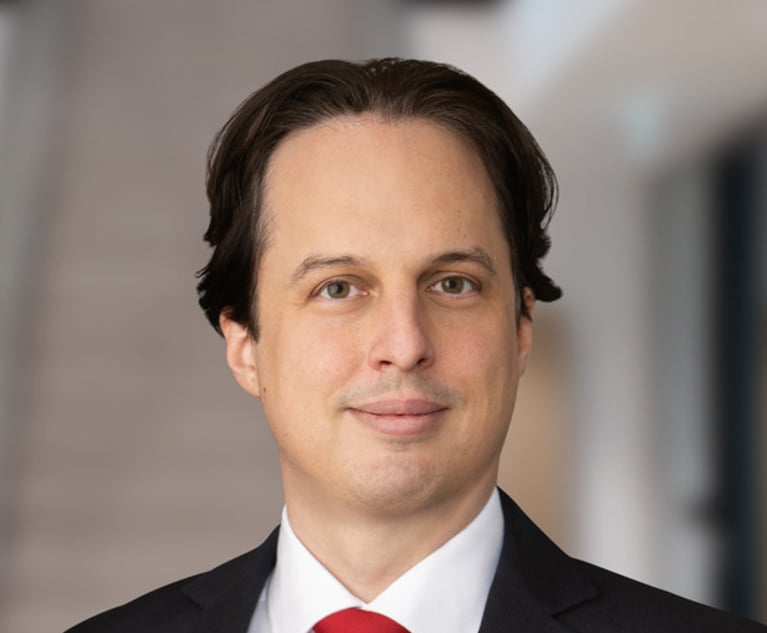Yes, the future really is bright
Telecommunications
January 21, 1999 at 09:30 AM
6 minute read
The audacious bid by Vodafone, the UK's largest mobile phone operator, for US mobile operator AirTouch has sent telecommunications shares surging.
If the $62bn (£37.5bn) deal goes ahead, Vodafone AirTouch will become the world's largest mobile phone company and larger than BT by market capitalisation.
Telecoms was already the top-performing sector on the London Stock Exchange in 1998, with share prices almost doubling – and City tipsters predict that telecoms stocks will again out-perform the market in 1999.
Telecoms counsel and their outside advisers face a daunting task just keeping up with the hectic pace at which their companies are growing.
The next 12 months look set to be dominated by a further wave of corporate activity – the area where companies are most likely to call on outside legal advice – as both traditional fixed-line operators such as British Telecom (BT) and mobile phone operators bid to create the first global telecoms companies.
But as well as having to cope with mergers and joint ventures, the typical telecoms department will also be handling such diverse issues as mutual outsourcing, deregulation, the Internet and e-commerce and the millennium bug.
This is not to mention the general legal work associated with any large business. Alan Whitfield, head of legal at BT, says: "People don't realise we actually run a very successful business as well."
Elizabeth Wall, who as group legal director of Cable & Wireless heads a 70-lawyer strong worldwide team, has no hesitation in describing telecoms as "the most vibrant business sector".
"Bigger seems to be beautiful," she says, putting the upsurge of mergers and acquisitions work down to consolidation within the industry and the convergence of technologies.
At the same time as the Vodafone deal, the City was also rife with speculation about a potential £7bn bid by US cable company NTL for last year's top performing stock on the London Stock Exchange, Colt Telecom – which saw its share price rise by a staggering 554% last year.
And there were also widespread reports that Cable & Wireless is looking for a merger partner to create a £60bn giant.
The pace of international expansion is no less daunting. UK companies in particular are looking to take advantage of a wave of liberalisation in Europe involving privatisations and licensing rounds.
The EC licensing directive, adopted last March, aims to create a single market for telecoms in Europe.
Companies are scrambling to set up joint ventures and alliances in bids to capture licences auctioned by national governments.
For the in-house lawyer finding local lawyers with the right telecoms experience to handle these deals can be a major headache.
Colt Telecom's legal services director Mark Jenkins, who was brought in last year to bolster the company's corporate experience, says: "It is not easy because only a small number of firms in those jurisdictions have a practice which leads to many conflicts."
As well as bracing themselves for future deals, many telecoms legal departments will also be coming to terms with the massive task of working through the glut of corporate deals announced last year.
According to BT's Whitfield, many of the company's 200-lawyer team are still heavily involved in seeing through BT's ground-breaking £6bn joint venture with AT&T, which was announced last September.
For the leading UK mobile phone operators – Vodafone, Cellnet, Orange and One-2-One – the extraordinary rate of growth in user numbers looks set to continue. In the last three months alone Vodafone added nearly one million new customers.
With the number of mobile phone users expected to rise in the UK from just above 20% to more than 50% in the next five years, in-house legal teams will be stretched as they cope with the roll-out of the companies' huge investment programmes in their networks.
Orange alone is investing £800m.
The surge in mobile phone use will receive yet more impetus later this year when the Government auctions off the third generation cellular telephony licences, known as UMTS.
Successfully obtaining one of the four or five licences expected to be on offer is of great importance to the major players, who have dedicated teams, including in-house counsel, working on the licence applications.
The technology behind this new generation of mobile telephones will see a vastly more efficient system – "it is staggering how much more effective it will be," says Chris Groves, a senior legal adviser at Orange, whose legal team expanded significantly last year.
Technological advances are also opening up new markets in other areas of information provision, such as broadcasting and the Internet.
Last year saw BT enter into an e-commerce alliance with Internet service provider Yahoo! and Cable & Wireless buy out MCI's Internet backbone business for £385m.
Meanwhile Energis, the telecoms company hived off from the National Grid just over a year ago, bought internet service provider Planet Online for £75m.
"Anyone in telecoms today will see that the Internet is the large opportunity of the future," says Cable & Wireless' Wall. "But it is difficult to get ahead of the game as the technology changes so quickly."
BT's Whitfield agrees. "We are moving into whole new areas of business," he says. "E-commerce is an area we are involved in as heavily as anyone.
"This pulls in areas such as data protection, copyright law and banking – there are lots of different angles."
Other major issues this year include the millennium bug – which particularly affects the sector – and number portability, following the recent Oftel ruling which requires companies to allow users to take their telephone number when changing their operator.
Furthermore, the new Competition Act and the Government's new competitiveness White Paper promise to put the industry at the forefront of a government liberalisation drive.
"We will have to come to grips with the Competition Act instantaneously," says Orange's Groves.
While Vodafone's legal director (Europe) Nick Godwin believes some of the regulatory burden which has dogged the sector should reduce over time, he says demand for these skills will not die away. "There is still a very substantial amount of legislation," he says.
So even the industry's regulatory and competition lawyers – traditionally seen by many as the pure telecoms lawyer – will find themselves stretched in 1999.
If 1998 was a busy year for telecoms lawyers, 1999 promises to be even more hectic. "I have just produced a hitlist of things to do for this year," Groves jokes ruefully. "It's alarmingly long."
Like most telecoms lawyers, he has a challenging year ahead.
This content has been archived. It is available through our partners, LexisNexis® and Bloomberg Law.
To view this content, please continue to their sites.
Not a Lexis Subscriber?
Subscribe Now
Not a Bloomberg Law Subscriber?
Subscribe Now
NOT FOR REPRINT
© 2025 ALM Global, LLC, All Rights Reserved. Request academic re-use from www.copyright.com. All other uses, submit a request to [email protected]. For more information visit Asset & Logo Licensing.
You Might Like
View All

Kim & Chang, Freshfields, A&O Shearman Take Top Spots for Highest Collective Deal Value as APAC M&A Grew By Just 1% in 2024

Another Partner Exits Deloitte Legal—Former M&A Head Joins UK Top 50 Law Firm

KPMG Law US Targets Alternative Business Licence, Shaking Up Legal Status Quo
3 minute readTrending Stories
- 1TikTok Law and TikTok Politics
- 2California Supreme Court Vacates Murder Conviction in Infant Abuse Case
- 3New York’s Proposed Legislation Restraining Transfer of Real Property
- 4Withers Hires Lawyers, Staff From LA Trusts and Estates Boutique
- 5To Speed Criminal Discovery, NY Bill Proposes Police-to-Prosecutor Pipeline For Records
Who Got The Work
Michael G. Bongiorno, Andrew Scott Dulberg and Elizabeth E. Driscoll from Wilmer Cutler Pickering Hale and Dorr have stepped in to represent Symbotic Inc., an A.I.-enabled technology platform that focuses on increasing supply chain efficiency, and other defendants in a pending shareholder derivative lawsuit. The case, filed Oct. 2 in Massachusetts District Court by the Brown Law Firm on behalf of Stephen Austen, accuses certain officers and directors of misleading investors in regard to Symbotic's potential for margin growth by failing to disclose that the company was not equipped to timely deploy its systems or manage expenses through project delays. The case, assigned to U.S. District Judge Nathaniel M. Gorton, is 1:24-cv-12522, Austen v. Cohen et al.
Who Got The Work
Edmund Polubinski and Marie Killmond of Davis Polk & Wardwell have entered appearances for data platform software development company MongoDB and other defendants in a pending shareholder derivative lawsuit. The action, filed Oct. 7 in New York Southern District Court by the Brown Law Firm, accuses the company's directors and/or officers of falsely expressing confidence in the company’s restructuring of its sales incentive plan and downplaying the severity of decreases in its upfront commitments. The case is 1:24-cv-07594, Roy v. Ittycheria et al.
Who Got The Work
Amy O. Bruchs and Kurt F. Ellison of Michael Best & Friedrich have entered appearances for Epic Systems Corp. in a pending employment discrimination lawsuit. The suit was filed Sept. 7 in Wisconsin Western District Court by Levine Eisberner LLC and Siri & Glimstad on behalf of a project manager who claims that he was wrongfully terminated after applying for a religious exemption to the defendant's COVID-19 vaccine mandate. The case, assigned to U.S. Magistrate Judge Anita Marie Boor, is 3:24-cv-00630, Secker, Nathan v. Epic Systems Corporation.
Who Got The Work
David X. Sullivan, Thomas J. Finn and Gregory A. Hall from McCarter & English have entered appearances for Sunrun Installation Services in a pending civil rights lawsuit. The complaint was filed Sept. 4 in Connecticut District Court by attorney Robert M. Berke on behalf of former employee George Edward Steins, who was arrested and charged with employing an unregistered home improvement salesperson. The complaint alleges that had Sunrun informed the Connecticut Department of Consumer Protection that the plaintiff's employment had ended in 2017 and that he no longer held Sunrun's home improvement contractor license, he would not have been hit with charges, which were dismissed in May 2024. The case, assigned to U.S. District Judge Jeffrey A. Meyer, is 3:24-cv-01423, Steins v. Sunrun, Inc. et al.
Who Got The Work
Greenberg Traurig shareholder Joshua L. Raskin has entered an appearance for boohoo.com UK Ltd. in a pending patent infringement lawsuit. The suit, filed Sept. 3 in Texas Eastern District Court by Rozier Hardt McDonough on behalf of Alto Dynamics, asserts five patents related to an online shopping platform. The case, assigned to U.S. District Judge Rodney Gilstrap, is 2:24-cv-00719, Alto Dynamics, LLC v. boohoo.com UK Limited.
Featured Firms
Law Offices of Gary Martin Hays & Associates, P.C.
(470) 294-1674
Law Offices of Mark E. Salomone
(857) 444-6468
Smith & Hassler
(713) 739-1250






